Annual Faculty and Staff Awards
Read about award recipients for the 2024-2025 academic year.
Distinguished Teaching
Distinguished Teaching Awardees are recognized for their excellence in teaching, contributions to student engagement and achievement, innovative instruction and commitment to student success.
Dr. Kira Abercromby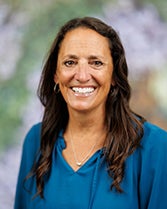
Professor
Aerospace Engineering
College of Engineering
Kira Abercromby, or “Dr. A” as she is affectionately known, invests her energy, expertise and passion into her students. She has great mastery of the subject matter which enables her to teach the most complex material in a way her students can understand. Her guest speakers — astronauts, NASA scientists and other aerospace professionals — provide an experience of a lifetime for those who take her classes.
One student describes her courses as among the most challenging in their academic career, and also among the most rewarding. “She makes every effort to instill world-class knowledge, laboratory experience and useful (and lasting!) understanding of the materials,” the student explains.
Students value the way she coaches them for conference presentations and her ability to help them engage effectively with industry partners, NASA professionals and others. They also praise the empathy and concern she demonstrates for students and their families — many describe her as having “heart” and showing endless kindnesses through the years. “From her light humor and almost unbelievable stories about her time at NASA to her wickedly smart wit and understanding of complex space systems, Dr. A is an incredibly unique addition to Cal Poly.”
Kira Jorgensen Abercromby obtained her undergraduate degree in astrophysics from UCLA and her master’s and doctorate in aerospace engineering from University of Colorado Boulder. Her thesis entails determining the material type of orbiting objects for material identification of orbital debris.
Dr. Scott Glysson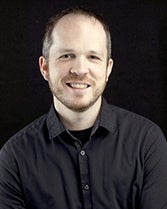
Associate Professor, Director of Choral Activities and Vocal Studies
Music Department
College of Liberal Arts
Scott Glysson is applauded by his students for helping them bring greater musicality to their art. He teaches them to become storytellers as well as musicians as they convey their artistry to the audience. “Without Dr. Glysson, Cal Poly’s choir program wouldn’t be what it is today,” notes one choir member. “With every piece of music we sing, we are taught the background of the piece, the composer’s message and how to sing with the highest level of musicality.”
Students note his ability to develop a strong sense of community in the choir. He consciously strives for equity among choir members, finding assistance for those students whose financial needs could otherwise limit their access to educational opportunities.
One student wrote that Dr. Glysson’s encouragement through the years enabled her to audition for and perform her first solo, something she thought she’d never be able to accomplish.
Yet another student shares, “Going to choir is one of my favorite times of the day. I’ve very rarely left practice without a smile on my face, and Dr. Glysson is the reason why. His love of music and support for his students is felt by every member in choir and anybody who watches us perform.”
Scott Glysson holds a Doctor of Musical Arts in choral conducting from the University of Arizona in Tucson. He also holds a Master of Music in choral conducting from the University of Arizona, and a Bachelor of Music in music education from George Mason University.
Dr. Kim Westermann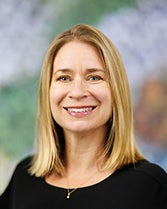
Professor
Accounting
Orfalea School of Business
Day one of any class with Kim Westermann is likely to be an adventure … whether she stands on a table to make her point or asks each student to recount the last time they lied, she captures her students’ attention and keeps it throughout their Cal Poly career and beyond.
Professor Westermann notches high marks from students and alumni alike, many of whom cite her ability to go beyond the textbook, pushing them to explore real case examples.
She is known for connecting students with industry professionals and supporting them as they enter a variety of careers. Students and alumni say, “She prepares us to tackle future challenges with confidence and insight.” “She inspired me to teach accounting.” “She prepared me well for my public accounting job.”
Of her ethics class in particular, students and alumni share:
- “I truly felt like I walked away a better person after taking her ethics class.”
- “She encourages Socratic thinking and intellectual curiosity from students. We read books, wrote essays, participated in weeklong experiments. It was overall a very enriching class that required reflection and thoughtful discussions. I still think about this course in my career as an attorney.”
- “I will forever look at the world differently after her accounting ethics class. It taught me more about life than any other core class I took at Cal Poly.”
Kim Westermann graduated from Cal Poly with a Bachelor of Science in accounting and earned her Ph.D. from Bentley University Ph.D. She was selected as the Henry E. Rauch Doctoral Fellow recipient.
Distinguished Scholarship
Distinguished Scholars exemplify the teacher-scholar model by involving students in their research and applying Cal Poly expertise in direct contributions to our region, state and nation.
Dr. Kristen O’Halloran Cardinal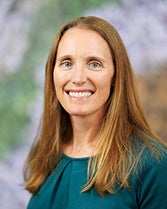
Department Chair
Biomedical Engineering
College of Engineering
Kristen O’Halloran Cardinal’s work offers something for everyone — students, colleagues, industry partners, cardiology patients, Cal Poly, even animal rights advocates can benefit. Her research focuses on developing tissue-engineered blood vessels for medical device testing. This innovative work enables more accurate testing of intravascular devices while potentially reducing the need for animal studies. In the process of conducting her research, Dr. Cardinal actively promotes Learn by Doing, enabling students to participate in experiments, present at conferences and collaborate with industry partners including Stryker Neurovascular, Medtronic and Edwards Lifesciences.
She’s played a crucial role in shaping curriculum for the biomedical engineering department. Dr. Cardinal also leads Cal Poly’s MEDITEC program which matches engineering students from a variety of disciplines with projects proposed and supported by the biomedical device industry. Her work has significantly enhanced Cal Poly’s reputation in biomedical engineering.
Dr. Cardinal is a member of MedTech Women and advocates for strong networking and mentoring among women and all people in the profession.
Kristen O’Halloran Cardinal earned a doctorate in biomedical engineering and a certificate in college teaching from the University of Arizona. She holds a bachelor’s degree in general engineering from Cal Poly.
Dr. Sarah Keadle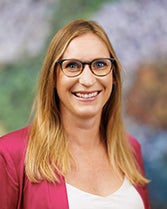
Professor
Kinesiology and Public Health
Bailey College of Science and Mathematics
If you’re sitting down as you read this, Sarah Keadle might suggest that you get up and take a walk around the block.
Her multidisciplinary research program aims to improve public health by incorporating cutting-edge technology to decrease sedentary behavior. She focuses on how wearable sensors can improve the reliability of self-reported activity data and how technology can help us develop effective interventions to reduce sitting and increase physical activity. Dr. Keadle has established herself as a national leader in wearable technology and public health research. She was among the first to discover that leisure-time physical activity lowers the risk of cancer in a widely cited publication of the American Medical Association.
She’s passionate about science training and education, and endeavors to support and broaden the next generation of scientists. Dr. Keadle has mentored more than 70 undergraduate students, advised on more than 30 student presentations at conferences, co-authored half of her Cal Poly publications with students, and collaborated with students from six different departments.
Sarah Keadle earned a doctorate and Master of Science in kinesiology from the University of Massachusetts Amherst, a Master of Public Health in quantitative methods from Harvard and a bachelor’s degree in health and exercise science at Wake Forest University. She is a Fellow in the American College of Sports Medicine.
Dr. Ryan Jenkins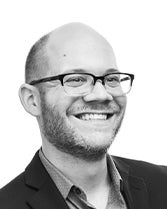
Professor
Philosophy, Associate Director of Ethics + Emerging Sciences
College of Liberal Arts
Wondering how artificial intelligence may affect the world in which we live? So does Professor Ryan Jenkins who researches the ethical and policy implications of technologies with the potential for profound impact to human life.
He studies how emerging technologies — autonomous vehicles, artificial intelligence, robotics and military technologies — enable or encumber meaningful human lives.
His research and collaborations synthesize the interests of stakeholders in academia, private industry and government to produce ethically informed policy recommendations.
He also raises and addresses key ethical questions through his writing and media appearances in high-profile publications like The Washington Post, Slate, NPR, Forbes and The New Yorker as well as many technical journals.
Dr. Jenkins is deeply committed to student mentorship and development. He has coauthored research with students and guided them towards careers in law, ethics and policy analysis. His work provides students with unique opportunities to present at conferences and engage in real-world policy discussions.
Ryan Jenkins earned his doctorate in philosophy from the University of Colorado Boulder and a bachelor’s degree in philosophy from Florida State University (Phi Beta Kappa). He earned the College of Liberal Arts’s Early Career Award for Achievement in Scholarship in spring 2021.
Outstanding Staff
Outstanding Staff Award winners are selected based on their dedication, loyalty, expertise and contributions to Cal Poly.
Dee Louie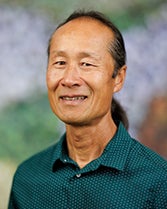
Retired Assistant Director
University Accounting and Reporting
University Financial Services
Dee Louie’s work ethic impresses everyone around him. He joined Cal Poly 19 years ago and progressed from an entry-level role through the accounting series into his final position as assistant director — always striving for excellence in financial reporting. He became a trusted resource across campus, known for assisting with questions and issues far beyond the sphere of accounting.
He developd deep expertise in both the technical details of accounting and the nuances of how it’s applied here. Importantly, he shared that information with others, offering careful explanations and proactively training colleagues on new tools and processes. Dee made it his mission to ensure that every accountant in his group was cross trained in their colleagues’ work to support one another and meet tight deadlines.
Dee consistently identified opportunities to improve processes, increase efficiency and ensure greater reliability. He always brought his spirit of continuous improvement to the team effort.
Dee was always approachable and willing to assist colleagues. His ability to listen actively and provide thoughtful solutions to problems made him a valuable resource to Cal Poly.
Throughout the COVID-19 work restrictions, Dee came to the campus every workday. He scanned thousands of documents so others on the team had what they needed to work from home.
Time and again, Dee demonstrated his exceptional dedication and loyalty as a reliable partner. If anyone “bleeds Cal Poly green,” it’s Dee.
Now retired, after nearly 20 years at Cal Poly, Dee Louie is enjoying biking, surfing and do-it-yourself projects at his house.
Joe Johnston 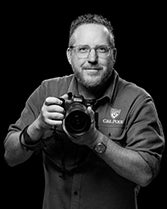
Senior University Photographer
University Communications and Marketing
If you’ve seen a great photograph representing Learn by Doing, it’s likely that Joe Johnston was the man behind the camera. Since joining Cal Poly in 2019 — as the first official campus photographer in more than two decades — Joe photographed and edited more than 26,300 images now available for campus use.
He goes where the photos take him, and that often requires working after hours, on weekends and during holiday breaks to capture some of Cal Poly’s most unique student experiences. He enables us to share the full Cal Poly story, because Learn by Doing doesn’t always take place during traditional business hours, it’s not always on campus, and it’s not necessarily convenient.
Joe seeks out opportunities that are off the beaten path. He will blaze his own trail to get the images needed for websites, marketing materials, fundraising, social media and more.
In addition to being a prolific and skilled photographer, Joe has been pivotal in defining the Cal Poly brand. He manages the PhotoShelter digital asset management system which makes it easy for others on campus to access high-quality photographs. He’s assisted with organizing head shot clinics for faculty and staff, and is a thoughtful and caring mentor to student photographers and his UCM colleagues.
As his supervisor Royaa Silver notes, “If a picture paints a thousand words, Joe has written millions and millions of words for Cal Poly.”
Joe Johnston earned a Bachelor of Arts degree from Cal Poly. He worked for several decades as a photojournalist before returning to support his alma mater. He’s received numerous awards for his work from the University Photographers’ Association of America and the Council for the Advancement and Support of Education, including the recent PhotoShelter Higher Ed Storyteller of the Year.
Missi Allison-Bullock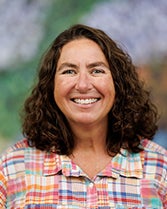
Director of ASI Programs and Services
ASI Business Management
If you don’t know her, you probably know her work. Missi Allison-Bullock creates memorable experiences for everyone at Cal Poly. She has collaborated with countless campus partners to provide fun, engaging and educational programming such as Rodeo entertainment, Mustang Mile Fun Runs, WOW concerts, and most recently the Morning on the Green event. She collaborates with the Center for Leadership and Service, Student Diversity and Belonging, and OUDI to provide entertainment for events like Change the Status Quo and Culture Fest.
Above all, Missi truly embodies a “Student First” mentality and encourages the best experience for students outside the classroom. She has a sharp eye for detail which leads to memorable events. Her keen understanding of risk management and human behavior makes her a strong advocate for the delicate balance necessary for student safety and enjoyment.
In 2023-24, Missi led ASI’s campus wide Needs and Feasibility Study seeking student, faculty and staff feedback about ASI facilities, programs and services. Her outreach efforts garnered a 15% student body response rate, providing ASI with valid and representative data about the student experience. The data has been used to inform ASI’s strategic plan priorities, facilities projects and programming.
Missi has built tremendous knowledge and expertise in event management. She is tapped for consultation by many Cal Poly departments for guidance on best practices for planning and executing safe and student-centered events.
A proud Cal Poly alumnus, Melissa Allison-Bullock began her Cal Poly career as a student employee. She was a teacher in the Children’s Center and went on to other roles in ASI Children’s Programs, ASI Events and ASI Craft Center. She’s currently director of ASI Programs and Services.
Outstanding Faculty Advisor
The Outstanding Faculty Advisor Award, established by the Academic Advising Council, recognizes one faculty member annually who has had a positive influence on students through academic advising.
Dr. Jennifer Mott Peuker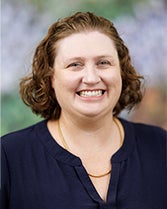
Associate Professor
Mechanical Engineering and Faculty Advisor
College of Engineering
Jennifer Mott Pekeur is recognized for her dedication to student success, particularly her extraordinary efforts to advise students leading into Cal Poly’s semester conversion. She balances her faculty and advising responsibilities with grace and never turns away a student regardless of whether they are her official advisee.
This past year has been particularly impactful as she’s provided extensive materials for both students and other faculty to understand and advise on the semester conversion, helping to ensure the large cohort of mechanical engineering students will be on track with the classes needed to graduate on time.
One colleague shares, “I have no doubt that the work she has done to understand the curriculum and provide students with advising resources is going to have a tremendous positive impact on student success and completion rates.”
Another colleague offers, “When referring students to Jennifer, I have complete confidence that they will receive not only accurate and thoughtful guidance on course selection, but also genuine support often delivered with her signature humor and warmth.”
Jennifer Mott Pekeur holds a bachelor’s degree in mechanical engineering from Cal Poly. She earned her Master of Science and doctorate in mechanical engineering from the University of Illinois Urbana-Champaign.
Provost's Leadership Award for Partnership in Philanthropy
Dr. Liz Thompson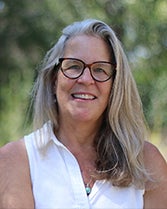
Retired Director of General Engineering
Professor in Industrial and Manufacturing Engineering
College of Engineering
Liz Thompson has a remarkable ability to engage donors, alumni and advancement staff to enhance educational initiatives, foster diversity and create transformative opportunities for students — all efforts that are closely aligned with Cal Poly’s strategic priorities.
Since 2011, she helped secure nearly $10 million in grants from the National Science Foundation (NSF). These funds are instrumental in supporting programs that promote diversity and inclusion within engineering education.
Her dedication to equitable learning opportunities is further evidenced by her leadership in the ENGAGE mentorship program, a collaborative initiative with Allan Hancock and Cuesta Colleges. This program supports underrepresented transfer students — particularly Hispanic and Latino students — ensuring they have the resources and mentorship needed to thrive in engineering and computer science disciplines.
As a co-advisor to Engineers Without Borders and Critical Global Engagement, Dr. Thompson is a mentor to students who work on international infrastructure projects, demonstrating the power of engineering as a tool for global change. Her guidance has helped attract funding and support from donors who are passionate about social impact and sustainable development.
A proud Cal Poly graduate and faculty member, Dr. Thompson embodies the Learn by Doing ethos. In her retirement, she continues to leverage her network to support Cal Poly’s future.
Dr. Lizabeth Thompson holds a bachelor’s degree in industrial engineering from Cal Poly. She earned a Master of Science degree in industrial and systems engineering and a Master of Business Administration from the University of Southern California. She also holds a doctorate in education from the University of California, Santa Barbara.
Dr. Peter Livingston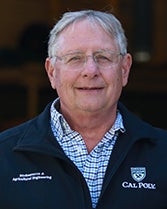
Director and Professor
BioResource & Agriculture Engineering (BRAE) Department
College of Agriculture, Food & Environmental Sciences
College of Engineering
Peter Livingston demonstrates an exceptional commitment to philanthropy. He successfully fundraises for major capital projects and endowments, develops strategic corporate partnerships and advances Cal Poly’s reputation in the industry.
Dr. Livingston played a key role in securing a $2 million gift for the Plant Sciences Complex Automation Center and is actively working to secure funding for the Water Quality Lab in the new Wurzel Building. These efforts align with Cal Poly’s strategic priorities, and advance research and training opportunities for students.
He’s also been pivotal in creating partnerships with organizations such as Topcon Corporation, Kubota and HatCo, building collaborations that provide funding for the university and access to state-of-the-art equipment and learning opportunities for our students.
His “BRAE in the Bay” event connects Cal Poly with more than 100 companies across multiple industries, expanding our network of supporters. Through his leadership, BRAE senior design projects regularly secure significant industry funding with partner organizations.
Dr. Livingston is passionate about service and dedicates several weeks annually to volunteer work, assisting developing countries with essential infrastructure projects, including water purification systems, housing and sanitation initiatives.
Dr. Livingston earned his bachelor’s degree from the University of Arizona in agricultural engineering. He holds a master’s degree from Colorado State University also in agricultural engineering.
